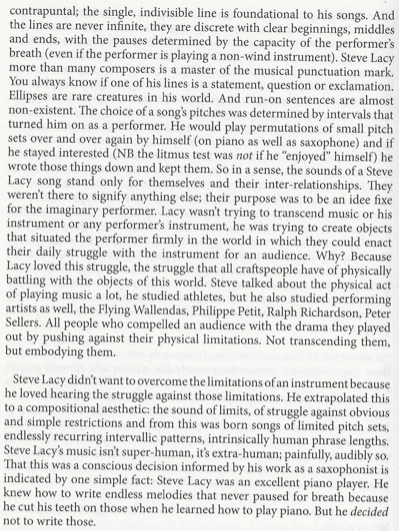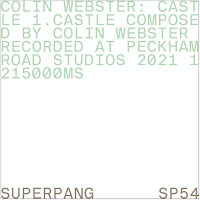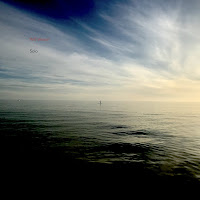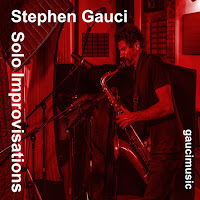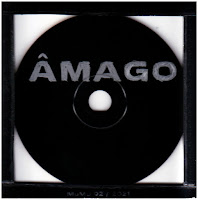It's time again for a solo sax review. Albums have been piling up again since our last overview in September 2022. And due to your humble servant's incredible slowness, some albums have in the meantime already been reviewed by more skilled - and faster - reviewers. Patrick Shiroishi's album was already reviewed here by Irina, Rob Brown by Gregg here, and Camila Nebbia by Jury here. All three come recommended, so it's a good thing they get multiple reviews.
My preference in this list of ten is this remarkable and very personal album by Patrick Shiroishi. Recorded in a "
" around 1.30 am in one take, the album has a unique voice, with sparse alto tones reverberating in the empty space. Shiroishi explains "
Shiroishi uses this space to maximum effect, as a pause between bursts of sound, as a contrast to give deeper value to his often beautiful phrases, as a moment of reflection on what you just heard, or just to experience the silence. At times there is background noise in the silence (a car? a bus?). It gives the voice of the alto a sense of desolation, not always in a negative way, sometimes as positive solitude, yet also sometimes as shrieks of anguish.
The single take and the unique sound makes this like a concept album, on which the different songs are all an integrated part of a much larger whole. Shiroishi also wonderfully manages to use his large array of technical skills to serve the ultimate sound he wants to achieve. No sound is cheap, but carefully crafted, balanced and paced, translating his deepfelt emotions into his own aesthetic.
The vinyl version has already been sold out, but luckily the digital version is still available.
Listen and download from Bandcamp.
Josh Sinton - Couloir & Book of Practitioners Vol. 2 (Self-Released, 2024)
As one of our first album reviews for 2024 we can present this double album by Josh Sinton on baritone saxophone.
The first one, "
Couloir" is a set of fifteen short pieces that Sinton describes as '
thinking out loud musically'. He takes the listener to various corners of a very large musical room, with incredible and gentle decisiveness, often surprised himself at what he is showing us, yet the compactness of the pieces, their specific character, ranging from relative playfulness to improvisations with a gravitas that is more suitable for the instrument's sound, make this a wonderful listen.
The second album is
Book W by Steve Lacy, one of his '
Books of Practitioners', and Sinton's sequel to his "
Book of Practitioners, Vol. 1" of last year. You can read the review and some more background on Lacy's books
here. It's also fun to compare it with John Raskin's take of the same material last year. The pieces are what Lacy intended them to be: exercises for practice, more than artistic endeavours, but as it is, the naturalness and the playfulness that Sinton demonstrates, lift the six pieces to a higher level.
Listen and download from Bandcamp.
Rob Brown - Oceanic (RogueArt, 2023)
Another solo alto album was released earlier last year by Rob Brown, one of the mainstays of the New York jazz scene for decades. Performing on no less than 140 albums, this is his second solo release, since "
Silver Sun Afternoon" from 2003, an album that I've never heard, so a comparison is not possible.
It's great to hear him play solo. Brown has a very clear and warm tone, and a natural tendency to lyricism in his improvisations, which are also his core trademark here. His playing is relatively straightforward, with limited use of extended techniques or timbral explorations, and he does not need to, because his approach lies elsewhere, in a kind of natural storytelling through music, translating impressions and feelings into sonic narratives, with moments of urgency, calm, excitement or just joy.
The eight tracks are inspired by the ocean, of which the first four form a suitelike sequence. It's hard to say whether the visual images of the ocean are directly reflected in the music, but the unpredictability, the various faces of the sea, its changing colours, the drifting on the waters, and the ever moving waves are easy to imagine through Brown's art.
Listen and download from Bandcamp.
Amalie Dahl - Memories (Sonic Transmissions Records, 2023)
Danish saxophonist Amalie Dahl is someone to look out for. She only ended her education at the Jazzdepartment at
Norwegian University for Science and Technology in Trondheim in 2021. One year later she already released her first album as a bandleader, “
Dafnie”, and now, another year later, her first solo album.
She is an artist with a daring vision, presenting sounds that are sometimes hard to classify, such as the combined playing and singing on the first track, or the whispered sounds during the intro of the second. Her tone is steady, decisive while at the same time sufficiently fluid and versatile to let the music evolve almost naturally and organically. She is also not afraid to let silence play its role, which is surprising for such a young musician. She is one of those artists who clearly does her own thing, very personal and heartfelt.
The theme of the album is a play on thoughts around the perception of time of "here and now", and of the memory that follows. "Life consists of a series of moments, a series of here and now, some of which remain as important events and discoveries that help to shape what is to come. Our identity is a sum of memories. These memories and moments can set off chain reactions that inspire and interact with new people in a constant flow". A moment can become a memory to revist time and again.
The solo album finds its conceptual counterpart on Amund Stenøien Quartet's "
Coming to pass", released on the same day by the same label.
Listen and download from Bandcamp.
Tom Chant - Solo (Hera Corp, 2023)
Irish saxophonist Tom Chant is a musician with many faces and musical genres. I first got to know him in the late '90s with the Cinematic Orchestra, in an earlier musical phase I was in, smooth, rhythmic, hypnotic music for imaginary movies. He also got to know the London free improv scene in the meantime, which has become his more natural habitat. Stuart Broomer reviewed another of his album recently with "
A Bright Nowhere" (actually/coincidentally today when I write this).
On this solo audio cassette, he presents his personal vision the solo genre: the pieces are all around five minutes long, whether on the tree tenor or three alto improvisations. This is really music that it 'in the moment', as you can expect from free improv. Chant explores the possibilities of multiphonics on his horn, creating amazing sounds, some of which remain stable while others change pitch. The sound is raw and unpolished, direct and unadorned.
As the liner notes adequately describe:
"Like in a Pinter play, sounds are "just there", staring at you; better just take them as they are. They will stop when they are tired, or bored. "Listen and download from Bandcamp.
Camila Nebbia - Una Ofrenda A La Ausencia (Relative Pitch, 2023)
In sixteen relatively short improvisations, Argentinian saxophonist Camila Nebbia demonstrates her art in all its versatility and creativity. I think it's already her third solo album, and it is recommended listening for fans of this kind of musical exposure of personal feelings and sentiments. The quality of her work resides not only in the technical skills on her instrument - which are varied and at times astonishing - but in the self-assured power of her presence, and the courage to reveal herself in such a way with no place to hide. Even if most of the pieces are short, she manages to convey something deep and meaningful, giving herself fully to the music. The title means '
an offering to absence', the paradox for the wealth of her offering us her musical presence.
Listen and download from Bandcamp.
Audrey Lauro - Sous Un Ciel D'Ecailles (El Negocito, 2022)
We've praised French altoist Audrey Lauro before on her albums with Giotis Diamandis "Dark Ballads" and here (2021), with Lauroshilau "Live At Padua" (2021), with Rachel Musson and Naoko Saito "点字呼吸の領域 [The Region of Braille Respiration]" (2020), with Giovanni di Domenico on "The Ear Cannot Be Filled With Hearing" (2018).
Now she treats us to a twenty-four minute long solo album, with a title that roughly translates as "Under a sky of scales". The performance was recorded at la Chapelle du Grand Hospice, one of those well-hidden venues in Brussels, on April 6, 2022.
It is a subtle, sensitive and inventive record, with a sound that resonates in the space of the chapel, the ideal setting for her multiphonic skills. The music is slow and precious, with the occasional burst of power, but mostly disciplined, controlled and free. Every sound appears to be precious and valuable to her, and that's the way we like it.
Listen and download from Bandcamp.
Adam Pieronczyk - On The Way (Self-Released, 2023)
Without a doubt, Polish saxophonist can be called a virtuoso on his instrument, which he demonstrates to the full on this third solo soprano saxophone album recorded live at a concert in Gdansk in December 2022. This year is also the 10th anniversary of his solo project, which started with "
The Planet Of Eternal Life" (2013), and "
Oaxaca Constellation" (2022).
His music is pure and playful, and his artistry is concentrated in the search of aesthetic beauty rather than in timbral explorations and finding new ways of expression. Maybe the reference that best comes to mind is the poetry of birds: singing without any other pretense than the joy of announcing the day and the pleasure of life itself. Two tracks are little bit slower and at times more melancholy ("
Philo" and "
Little Beings From The Basswood"), yet never for long, and are equally impressive.
For once, it's also good to hear the enthusiastic audience during the performance.
Bruno Parrinha - Da Erosão (4DA Records, 2023)
Portuguese altoist Bruno Parrinha is - at least to me - best known for his collaborations with his fellow countrymen Ernesto Rodrigues (seven albums together this year!), Sei Miguel and Luis Lopes, but here we find him on his frist solo album.
Parrinha's tone is warm, soulful, welcoming and sad. The melancholy of his tone is well described in a poem he wrote, which I let 'deepl' translate into English, which is possibly not the most accurate tool to translate poetry, but I'm sure it somehow captures the spirit. "The erosion of me" is a painful image, and that melancholy sense of things moving away from you captures the sound wel.
The sound is direct, as if you were standing next to him, listening in to his private expressions of sadness. On some tracks, such as "
Condição Eólica", he takes a more adventurous tone, expressing the sound of wind. The last track is an incredible feat of circular breathing, that not only shows his skills at the instrument, but also encapsulates the essence of the album through its kaleidoscopic yet coherent variation.
Music straight from the heart.
Listen and download from Bandcamp.
Nicolas Stephan - Null (Petit Label, 2023)
'Null' is a relatively short thirty minutes of solo improvisation by French saxophonist Nicolas Stephan. He wanted to strip his instrument of all superfluous things, and let it take the lead, accepting minor mistakes, and follow wherever the moment brings the sound. He plays tenor and straight alto, and at moments also synth and trumpet. His playing is good, warm, intimate, pleasurable, until he adds abrasive background taped sound to challenge his music. It distorts his original intention, and - in my opinion - reduces the quality of his playing. The best track on the album is the third, a moving, beautiful and very tightly controlled improvisation. On the last track, sample music creates the overall sound. I'm somewhat mystified what this adds to the music, but I'll let the reader decide. I'm sure the artist had a clear plan, but it's a missed opportunity.
Listen and download from Bandcamp.

















